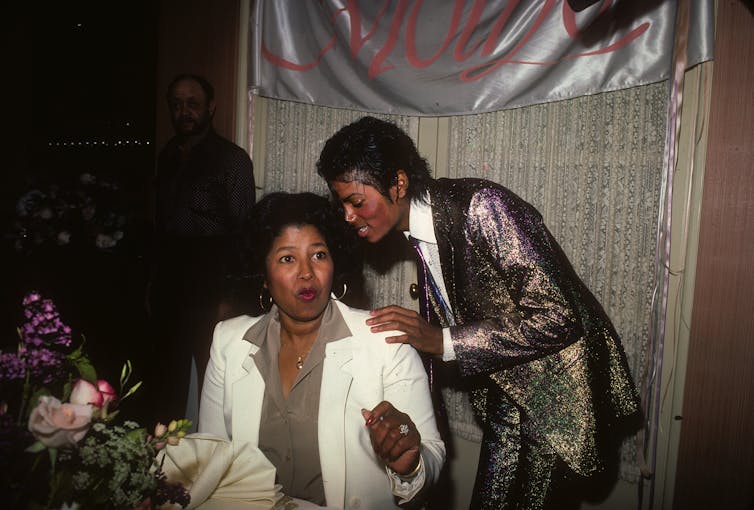Michael Jackson died in 2009, leaving behind a complicated legacy, but one thing remains true: The King of Pop’s music still generates millions of dollars in revenue every year. A Jackson biopic is scheduled for release in 2025, and the Broadway show “MJ” has brought his music to theaters around the world.
But despite Jackson’s continuing musical success, his estate has been in limbo for more than a decade due to a drawn-out dispute over more than $700 million in taxes, allegedly stemming from the IRS and other legal issues.
The latest development in the case came on August 21, 2024, when a California Court of Appeal approved a $600 million asset sale proposed by Jackson’s estate.
As law professors who teach trusts and estates, we believe Michael Jackson’s estate offers some lessons for anyone considering writing a will, even if they don’t have the King of Pop’s level of wealth.
Mothers and Multinational Corporations
When Jackson signed his will in 2002, he left almost all of his assets to his children through trusts, leaving their mother with only minor rights during her lifetime.
His will also contained a common clause authorizing the executors of his estate to sell assets of his estate “on such terms as the executors may think best.” The proceeds of any sale would be distributed to his children.
In February 2024, Jackson’s executors negotiated a deal to sell most of Jackson’s music catalog to a joint venture with Sony for $600 million, described by The New York Times as a “blockbuster deal.”
However, Jackson’s mother, Katherine Jackson, opposed the move, because, as the court explained, “Michael had told his family before his death that his assets should never be sold.”

Jeffrey Meyer/WireImage via Getty Images
However, in mid-August, the California Court of Appeal rejected Katherine Jackson’s arguments and issued a final ruling approving the proposed sale.
Legal Requirements for a Valid Will
It’s common to casually discuss estate planning with family and friends, but those wishes are not legally enforceable unless they are written into a valid will, trust, deed, or contract.
In most states, including California, where Jackson died, a will must typically be in writing, signed by the person making the will (called the “testator”) and signed by two witnesses who see the testator sign the will.
These requirements allow the court to distinguish between the final version that the testator intends to take effect upon death and earlier drafts or notes. These rules also require the testator to preserve reliable evidence of their estate plan, which can be useful in probate proceedings held in court after the testator’s death.
Interpretation of the text of a will
When a will’s meaning is unclear, courts can call witnesses to testify as to how the will’s language should be interpreted. Katherine Jackson did just that, arguing that when Michael donated his “entire estate” to the trust, he intended for the trust to receive his assets in substantially the same form as they would have been when he died.
According to Katherine, Michael wanted to transfer his music catalog to a trust rather than receive any proceeds from sales of the catalog or partial control over the catalog.
However, the court disagreed with Katherine’s interpretation because Michael’s will gave his executor broad powers during the probate period. The court explained that while the trust receives distributions from the estate, the executor has “full power to sell estate assets” during the administration of the estate.
Executor’s right to sell estate property
The importance of executor powers in estate planning is often overlooked because they are one of the most technical terms in a will, but the dispute over Jackson’s estate shows that executor powers can play a critical role in estate administration.
Estate planning attorneys typically advise their clients to give their executors broad powers to buy and sell estate property during probate so they don’t have to waste time and money obtaining court approval for routine transactions.
Thus, the broad powers of the executor, as Jackson provided in his will, reduce transaction costs in the long run. This increases the net value of the estate that is ultimately distributed to the beneficiaries. Trust law protects the estate by holding executors personally liable for abuse of power.
Special Asset Inheritance Planning
When advising clients with special assets like Michael Jackson’s music catalog, estate planning attorneys typically do not recommend that testators restrict the sale of valuable property because it is difficult to predict how circumstances may change in the future.
In one famous example of this blunder, Joseph Pulitzer, founder of the Pulitzer Prize and a 20th century media titan, left a will that forbade his executors from selling his shares in his beloved newspaper business.
Twenty years after Pulitzer’s death in 1911, the newspaper business had become unprofitable. Pulitzer’s trustees therefore sought leave to amend his will in a New York court, arguing that Pulitzer had failed to foresee the paper’s changing fortunes. The court agreed, finding that “the continued publication of the newspaper would likely seriously damage or destroy a substantial part of the trust estate.”
The Pulitzer case shows how limiting the powers of executors and trustees can backfire, an issue Jackson’s lawyers clearly wanted to avoid.
Estate Planning Lessons
An estate plan can only be enforced if it is formalized in a document such as a will. Once formalized in writing, courts will be hesitant to change the estate plan based on posthumous testimony regarding the testator’s oral statements, even if those wishes were expressed to the parents.
Therefore, testators should pay close attention to every provision of their will, including technical terms that will need to be explained by a drafting lawyer. Testators should also be aware of the following: Although it may be tempting to want to control your estate after your death, restrictions that may seem desirable during your lifetime may backfire after your death.
#Estate #planning #lessons #million #battle #Michael #Jacksons #music #catalog